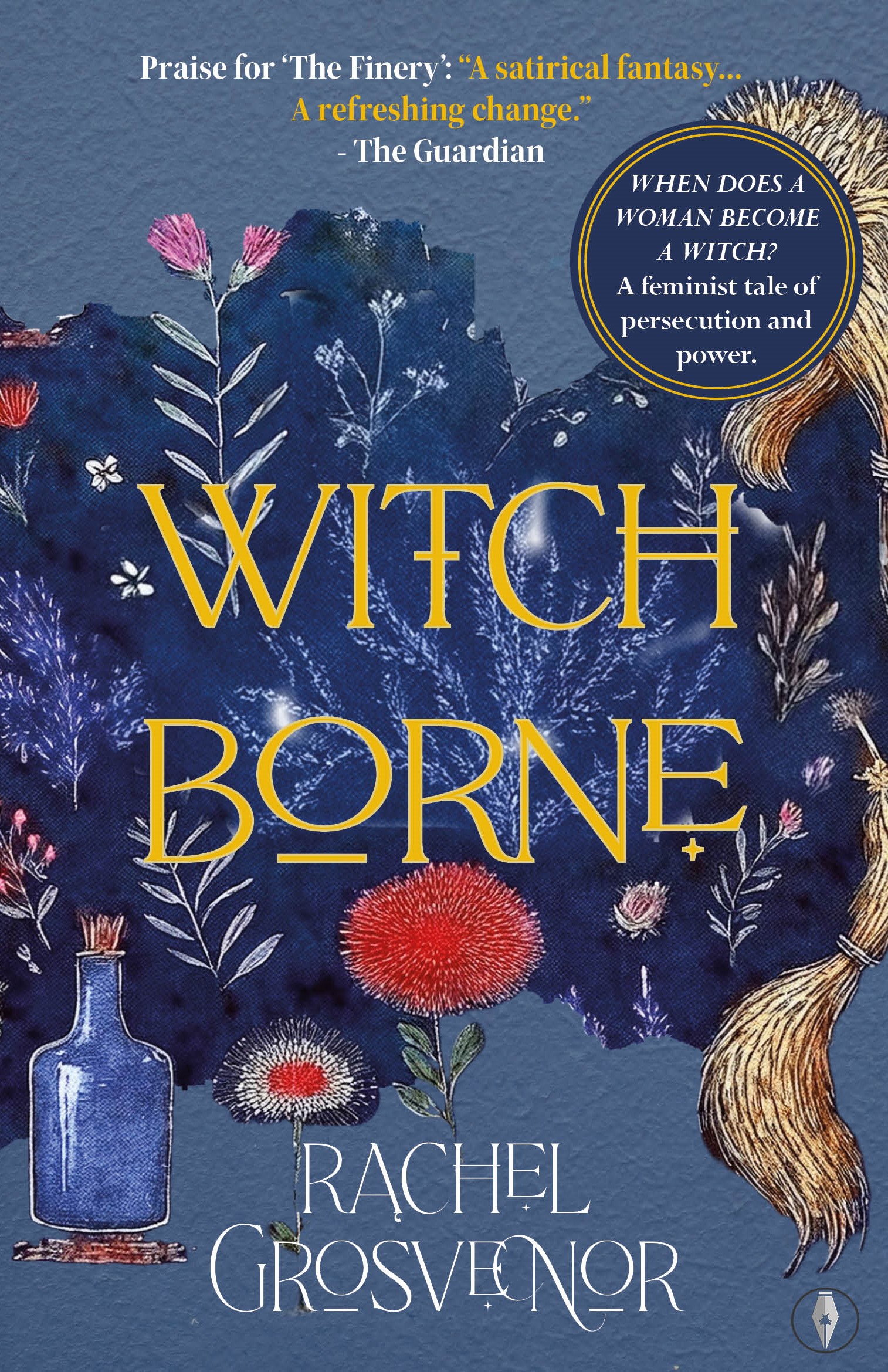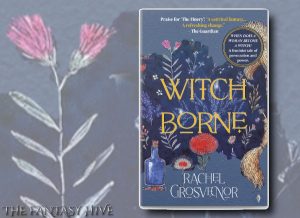WITCHBORNE by Rachel Grosvenor (BOOK REVIEW)
FROM THE AUTHOR OF ‘THE FINERY’ COMES A BLAZING FEMINIST TALE OF PERSECUTION AND MAGIC…
In medieval Locklear, Agnes harbours a dangerous secret—she can touch fire without being burned.
As war rages beyond the town and whispers of witchcraft echo through its streets, Agnes navigates arranged marriages, rivals’ schemes, and the threat of the hangman’s noose.
When a desperate bargain with a local widow goes awry, Agnes’s world erupts in flames—she is accused of witchcraft.
In a society that fears female power, can Agnes find the strength to forge her own destiny?
The cover tagline for Rachel Grosvenor’s new book, Witchborne, is
When does a woman become a witch – a feminist tale of persecution and power
 The setting – with the seventeen year old protagonist Agnes living in the village of Locklear within ‘The Kingdom’ – has the secondary world nature of strange places and unknown history, alongside the familiar cultural features of medieval England. For example, tanning – as the base industry of leatherworking – features heavily, at once necessary for its products, but despised for the stench of urine and animal offal that goes with scraping and curing hides, tainting all who work or live in its shadow. The characters’ meals are a simple fare in which turnips and cabbage feature heavily, for (unlike Tolkien’s Shire) this world has not discovered the potato yet.
The setting – with the seventeen year old protagonist Agnes living in the village of Locklear within ‘The Kingdom’ – has the secondary world nature of strange places and unknown history, alongside the familiar cultural features of medieval England. For example, tanning – as the base industry of leatherworking – features heavily, at once necessary for its products, but despised for the stench of urine and animal offal that goes with scraping and curing hides, tainting all who work or live in its shadow. The characters’ meals are a simple fare in which turnips and cabbage feature heavily, for (unlike Tolkien’s Shire) this world has not discovered the potato yet.
This is a place and a time that fears God, whose will is promulgated by the village Grothi or priest, and which believes that the world hierarchy with the king at its peak is divinely ordained. A shadowy rebel movement is dismissed by one character
“They want a world without royalty, divined by the Gods. If you can imagine such a world, then picture a scene of fire and ruin, from which there is no return.”
That certainty that the world they live in is the only one possible, the only way of living and that any other approach is not only ruinous but – to quote a well-known Sicilian – “inconceivable”, put me in mind of the Ursula Le Guin quote “We live in capitalism, its power seems inescapable—but then, so did the divine right of kings. Any human power can be resisted and changed by human beings.”
However, Agnes, seventeen-year-old daughter of the town blacksmith and his wife – is desperately unworldly, having barely travelled beyond the borders of the town and with no knowledge of other places or ways of living. Her world is a world of superstition and patriarchy and she struggles to build a life within those philosophical, political and geographic confines.
Male children are a boon needed to continue the family business, female children are a burden to be married off at the earliest opportunity and to serve their new family by quickly delivering the essential male heir.
Like modern right-wing populism, the patriarchy of Lochlear is riven with internal contradictions. Just as today’s Schrodinger’s Immigrants are simultaneously idle scroungers and stealers of jobs, so too Lochlear’s women are at once weak piping vessels and yet potentially fearsome witches, at once a burden on a family and yet essential to the smooth running of society.
But this is a fantasy world where magic abounds, Agnes – as a spring born child – has a gift from the gods. Like Kirstin Cashore’s graces in Graceling the gifts vary enormously and do not immediately reveal themselves. In Agnes’ case the gift of invulnerability to heat/fire is so powerful a one that her parents force her to hide it – for a powerful woman (no matter if the gift is god given) – must be a witch and will be taken into the woods and hung.
There are other reasons why a Lochlear woman might be judged a witch, particularly around tampering with matters of childbirth and pregnancy. Which reminded me of the 1688 case of Elizabeth Balleans – described in Blessin Adams excellent Great and Horrible News; Murder and Mayhem in Early Modern Britain. Raped and impregnated by her employer, then losing the child to a tragic still birth – she was nonetheless arraigned on a charge of ‘child destruction’ facing a potential death penalty. With the current US political climate, that obscene misogynistic perspective on obstetric trauma seems to be making an unwelcome come back. As I was just discussing in a writing group, fiction and particular fantasy-fiction has that ‘fable’ like power to confront contemporary realities as Albert Camus said “Fiction is the lie through which we tell the truth.”
Agnes’ own maternal woes begin soon after her marriage to Silo the tanner’s son. It is a marriage brokered by her unreliable ‘friend’ Saskia – who has herself secured the hand of the handsome, rich and well-regarded Finn.
The ‘contest’ between the worldly and assured Saskia and the naïve and desperate to succeed Agnes is too uneven to be called a rivalry. It reminds me a bit of the battles between golden haired Nellie Olsen and homespun Laura Ingalls in Little House on the Prairie, for example when Saskia is laying the ground for her match-making to pair Agnes off with an uninspiring partner.
“Ah, it’s nothing. Just that the tanner’s son said something about you.” The words came out as a sort of purr, gleeful and sour.
At least Laura Ingalls had supportive parents, where Agnes’ just seem keen to lose a mouth that needs feeding.
Agnes makes some bad decisions and – in a tight knit small community – it is impossible to escape the echoes of shame and embarrassment that haunt her and both her old and her new families.
Her desperate efforts to recoup some squandered social capital lead her to the Widow Sewall in search of aid in getting pregnant. The midwives of Lochlear and its surroundings – Widow Pluck, Widow Sewall – have a status above other women. Just as the midwives of seventeenth century England proved respected (and sympathetic) witnesses in the trial of Elizabeth Balleans, Grosvenor’s midwives get a degree of respect from the Grothi and the other men of the village. In Widow Sewall’s case, that respect slips easily into fear – for a powerful woman is a threat unless she knows and accepts her place.
Grosvenor’s narrative twists around these fixed features of Lochlear society, like wattle woven around shafts of hazel in a hut’s mud wall. Old secrets emerge and past victims find a voice.
Agnes – for most of the book – knows no other way than submitting to the will and ambitions of others, be they her parents, her husband or her father-in-law. The family has started the book in disgrace for her elder brother – who was to have inherited the title and business of blacksmith –has run off to join the rebels and is lost rather than mourned by his family.
Grosvenor’s prose catches that conflict of Agnes’ emotions, thinking of her once loved now absent sibling
She felt a sudden hatred flicker through her heart towards her brother The line between love and hate was thin; she walked that tightrope for her entire family.
Or struggling to come to terms with the unfamiliar arrangements of her new home.
“Of course, Silo, I didn’t know where they were kept,” Agnes eventually said, rage bubbling up her windpipe and threatening to blister into her mouth. She swallowed it down.
Lochlear is a place determined to keep women in their place – which is apparently servile and grateful. Those who are willing to fit that mould are rewarded, Saskia – ‘awarded’ a gift despite not being spring born, gaining the most eligible husband, idolized as the ‘talisman’ a sort of spring fair queen, and with a maid to save her from the humdrum domestic duties that burden Agnes. That privilege culminates in the unparalleled luxury of a stone house.
The stones had started to be delivered to Saskia’s new pitch, and each time a new delivery arrived, word spread through the town like liquid seeping under doors.
The stone house was built quickly, blossoming before the autumn trees as if making fun of them for their loss of leaves.
Against this disadvantage Agnes’ longed for baby is her only solace, but the lengths she went to mean the blessing is not as clear cut as she would like. There is in Godwin, something unsettling, not quite Rosemary’s Baby or a Midwitch Cuckoo – possibly it’s just the disassociation that can come with post-natal depression. But there is a strangeness about Agnes’ pregnancy and the nature of the promise she made to the Widow Sewall.
Ultimately this is a tale told from the underside of the patriarchy, with a protagonist whose own world view is tightly circumscribed. The answers Agnes needs are not to be found in Lochlear and with that realization she can at last begin to grow.
Witchborne is available now – you can order your copy on Bookshop.org

